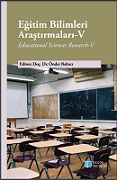CIPP Program Değerlendirme Modeli ile Yapılan Çalışmaların Meta Değerlendirmesi
Meta Evaluation of Studies Conducted with the CIPP Curriculum Evaluation Model
Author(s): Menderes Ünal, Dildar Özaslan
Subject(s): Education, School education, State/Government and Education
Published by: Özgür Yayın Dağıtım Ltd. Şti.
Keywords: meta-evaluation; curriculum evaluation; education; curriculum; CIPP evaluation model;
Summary/Abstract: This study aimed to conduct a meta-evaluation of curriculum evaluation studies conducted in Turkey using Stufflebeam's CIPP evaluation model. The studies were examined in terms of both the criteria of the CIPP model and the appropriateness of the scientific research methodology, and an overall assessment was attempted to be presented. Adopting a qualitative research method, the study employed a case study design and was conducted as a meta-evaluation. The meta-evaluation of studies conducted in Turkey using Stufflebeam's CIPP evaluation model was carried out, and the current situation was attempted to be revealed through document analysis. Data were collected through the "Control Checklist for Suitability in Terms of the CIPP Evaluation Model" and the "Control Checklist for Suitability in Terms of Scientific Research Methodology" developed by the researchers. The population of the study consisted of all curriculum evaluation studies conducted with the CIPP Program Evaluation Model, and the sample consisted of 5 articles, 5 master's theses, and 5 doctoral dissertations randomly selected. The studies included in the meta-evaluation were examined by two experts, and the expressions "Yes," "No," and "Partially" were marked. Then, the opinions of the two experts were compared, and an attempt was made to reach a consensus, and a common decision was made about the degree to which the studies met the criteria. The study revealed that the studies largely aligned with the principles of the CIPP Program Evaluation Model, but some important principles were overlooked. Regarding the context dimension, the criteria were largely emphasized, but some principles, such as the level of responsiveness of the objectives to the needs, were neglected. In the process dimension, it was found that there were inconsistencies with the control checklist in terms of the identification of records and errors, despite the achievement of alignment between the planned and implemented activities. In the product dimension, it was concluded that the evaluation of the curriculum's product in relation to the context, input, and process was not conducted, and recommendations were ignored. In terms of compliance with scientific research criteria, the introduction, methodology, findings, conclusions, and recommendations were generally in line with the control checklist. However, it can be stated that there were deficiencies in problem statement and interpretation of results based on the authors' perspectives.
Book: Eğitim Bilimleri Araştırmaları - V
- Page Range: 13-37
- Page Count: 25
- Publication Year: 2023
- Language: Turkish
- Content File-PDF

